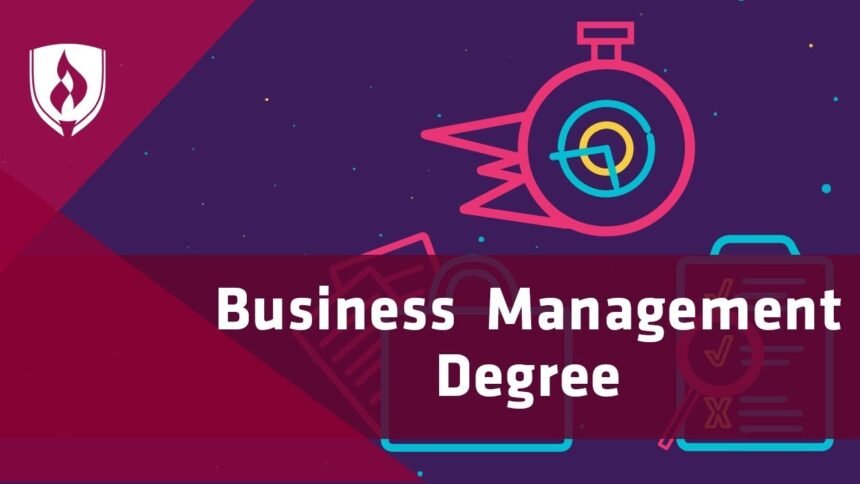Picture this: you’re standing at the helm of a thriving company, making decisions that shape its future, all while earning a paycheck that reflects your worth. For many Americans, this dream feels just out of reach—until they discover the power of a business management degree. It’s more than a piece of paper; it’s a launchpad into a world of opportunity, blending practical skills with big-picture thinking. Whether you’re a high school grad weighing your options or a mid-career professional craving a change, this degree promises a path to leadership, stability, and success. In a nation built on ambition and enterprise, let’s dive into why a business management degree might just be the key to unlocking your potential—and how it’s shaping the workforce of tomorrow.
Understanding the Basics
At its heart, a business management degree is about learning how to run the show. It’s a versatile program that covers everything from finance and marketing to human resources and operations. Think of it as a crash course in keeping organizations humming—whether that’s a small startup or a corporate giant. For Americans, where entrepreneurship and innovation drive the economy, this education offers a solid foundation to thrive in a competitive landscape.
Unlike niche degrees, this one casts a wide net. You’ll study leadership principles, strategic planning, and even a bit of psychology to understand what makes people tick. As one Reddit user in r/businessschool put it, “It’s like getting a toolbox for every part of a company—I didn’t realize how much I’d use it until I started working.” Consequently, graduates emerge ready to tackle real-world challenges, equipped with skills that employers crave across industries.
The American Advantage
In a country where the job market shifts quicker than a New York minute, adaptability is king. That’s where a business management degree shines. The U.S. Bureau of Labor Statistics projects steady growth in management roles through 2030, with median salaries hovering around $100,000 a year—well above the national average. For Americans chasing financial security and career mobility, that’s a compelling draw.
Beyond the numbers, though, this degree taps into the American ethos of hustle and leadership. It’s not just about landing a job; it’s about building a future. On Reddit’s r/careeradvice, one user shared, “I got my degree at 28 after years of dead-end jobs. Now I’m managing a team and actually feel in control of my life.” Moreover, the skills you gain—like problem-solving, communication, and decision-making—translate anywhere, from Wall Street to Silicon Valley. In a culture that rewards initiative, this education empowers you to take the reins.
Digging Deeper: The Payoff
So, what’s in it for you? Let’s break it down. First, there’s the career versatility. With this degree, you’re not locked into one path. You could oversee a retail chain, launch your own business, or climb the corporate ladder in finance. The options are vast, and that’s a big deal in a job market that values flexibility.
Next, consider the earning potential. Entry-level roles like assistant manager might start at $50,000, but with experience, you could hit six figues as a project manager or executive. For Americans juggling student loans or family expenses, that upward trajectory matters. Plus, the degree often comes with networking perks—think internships, alumni connections, and mentorships that open doors you didn’t even know existed.
Finally, there’s personal growth. Studying business management sharpens your critical thinking and confidence. Dr. John Maxwell, a renowned leadership expert, once said, “Management is about persuading people to do things they do not want to do, while leadership is about inspiring people to do things they never thought they could.” This blend of inspiration and practicality is what the degree instills, preparing you for life beyond the office.
Maximizing Your Investment
Getting the degree is just the start—maximizing it takes strategy. For starters, choose a program that fits your goals. Some schools emphasize entrepreneurship, while others lean into corporate management or analytics. Researching accreditation and course offerings ensures you’re investing in quality.
Once enrolled, dive in. Take electives like digital marketing or supply chain management to round out your skill set. Internships are gold—real-world experience sets you apart when employers sift through resumes. On r/college, a student advised, “Don’t sleep on internships. I got hired full-time because my boss saw me in action.” Additionally, build relationships with professors and peers; they’re your first professional network.
After graduation, keep learning. The business world evolves—think AI, sustainability, or remote work trends. Certifications in project management (like PMP) or data analysis can boost your edge. Ultimately, the degree is a foundation; how you build on it determines your altitude.
Facing the Critics
Let’s address the elephant in the room: not everyone thinks a business management degree is worth it. Critics argue it’s too broad, or that experience trumps education. Fair points—but here’s the counter. While hands-on know-how matters, the degree gives you a framework to turn experience into results. It’s the difference between fumbling through trial and error and hitting the ground running with proven strategies.
Cost is another hurdle. Tuition can range from $10,000 at a community college to $50,000+ at a private university. For many Americans, that’s daunting. However, scholarships, online programs, and part-time options make it more accessible than ever. One Redditor in r/studentloans shared, “I worked while studying and graduated debt-free. It’s doable if you plan smart.” Thus, while challenges exist, they’re not dealbreakers—they’re just part of the journey.
Looking Ahead
The Future of Business Management in America
Looking ahead, the demand for skilled managers isn’t slowing down. Technology is reshaping how businesses operate, from e-commerce to remote teams, and companies need leaders who can adapt. A business management degree prepares you for that shift, blending timeless principles with modern tools.
Sustainability is another hot topic. Consumers and regulators alike push for ethical practices, and managers with this training can steer firms toward greener strategies. Meanwhile, the gig economy and startup boom mean more Americans are striking out on their own—armed with a degree, they’ve got a head start. As industries evolve, so does the value of this education, making it a future-proof choice.
Concluding Thoughts: Your Next Move
In the end, a business management degree isn’t just about climbing the corporate ladder—it’s about building a life you’re proud of. For Americans, it’s a ticket to stability, influence, and the chance to leave a mark. Sure, it takes effort, money, and grit, but the payoff? A career that rewards your ambition and skills that last a lifetime. From the Reddit threads to the boardrooms, the message is clear: this degree opens doors you didn’t even know were there.
So, if you’re standing at a crossroads, wondering how to turn your dreams into action, consider this path. It’s not a magic bullet, but it’s a powerful tool—one that equips you to lead, innovate, and thrive in a world that’s always changing. What’s your next step? Maybe it’s time to find out.






